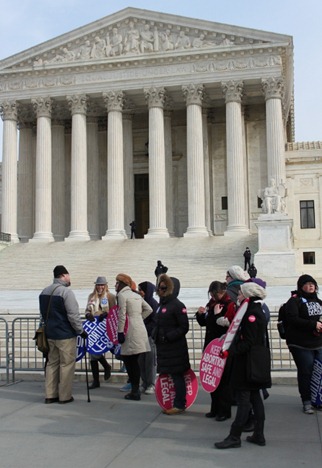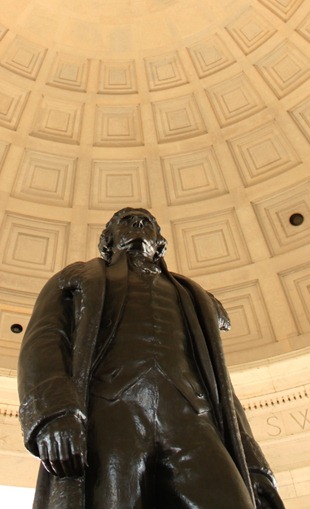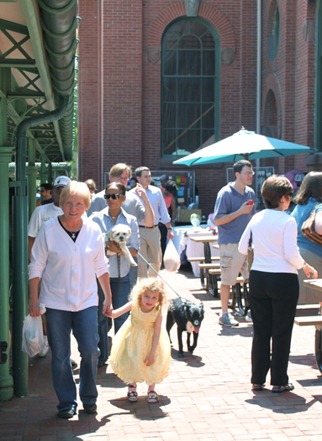[The angel] called out with a mighty voice, ‘Fallen, fallen is Babylon the great!’ … Then I heard another voice from heaven saying, ‘Come out of her, my people, so that you do not take part in her sins, and so that you do not share in her plagues…'”
– Revelation 18:2, 4
As residents of the capital of the greatest imperial power the world has ever known, we at Capitol Hill Friends are greatly challenged to live as a faithful expression of Christ’s reign. We recognize that we are deeply affected by the surrounding culture, that the attitudes and assumptions of our neighbors, families and friends are often diametrically opposed to the demands of the gospel. Yet, we feel that Christ has called us to remain in this environment, as much of a challenge as it often presents to our faith. We feel assured by the Holy Spirit that God has work for us to do here, and we have been directed to remain and encourage the formation of a witnessing community that shares the good news and new life that we are finding in Jesus.
directed to remain and encourage the formation of a witnessing community that shares the good news and new life that we are finding in Jesus.
Though we sense the Lord’s command to remain and set down roots in Washington, we recognize that life in the city is and will continue to be a serious challenge to our faith and our cohesion as a group. The entire environment is laced with anti-Kingdom assumptions. Ideas about who the important people are; what worthy goals are; what power is; and where meaning comes from. Our faith as present-day disciples of Jesus of Nazareth is under steady pressure to conform to the image of the world around us.
Finding ourselves in such a challenging situation, we seek together for ways to ground ourselves in the living reality of Christ’s presence. We support one another in our personal disciplines – prayer, study, service and gospel witness. Yet we also recognize that personal discipline is not enough. We can develop deep personal disciplines to keep us in touch with God, yet we remain  spiritual weaklings if we are not incorporated into the Body of Christ. We must be bonded into a coherent church community, not just a collection of spiritually athletic individuals.
spiritual weaklings if we are not incorporated into the Body of Christ. We must be bonded into a coherent church community, not just a collection of spiritually athletic individuals.
This is harder for us. Because we do live in such an atomized, individualistic environment, developing the life of the local church as our primary commitment is deeply counter-cultural. Sometimes, it seems that the simple act of gathering together weekly for fellowship, study and worship is about as much as we can handle. Our lives are so full of work, family and social commitments. There is so much to do and so little time to do it in.
Our priorities are distorted. We have put the focus on our individual preferences, careers and social networks, yet we are called to place Jesus and his Body – the community of those who are drawn  together to be his disciples – at the center of our lives. The Christian community should not be simply one more obligation to meet among many others. On the contrary, it should be the social foundation from which the rest of our lives grow. The church must be our primary identity.
together to be his disciples – at the center of our lives. The Christian community should not be simply one more obligation to meet among many others. On the contrary, it should be the social foundation from which the rest of our lives grow. The church must be our primary identity.
In his book, Living in Christian Community, Art Gish asserts that, “we are defined by the people we are a part of. … Those who have no identity apart from the world have nothing solid in their lives.”(1) If this is true, then we will never be empowered to emerge from the oppressive culture of busyness, loneliness, self-promotion and greed that hangs over our city like a fog. That is, not until we come to see our shared life as Christ’s disciples as our primary identity, a base from which we interact with the rest of society.
For centuries, a concept that was central to the self-understanding of Friends was that of the hedge. The hedge referred to a protective barrier that maintained a distinction between Quakers and the wider society. The hedge was a spiritual reality, but it was represented in a variety of very practical ways – distinctive dress and speech that instantly set Friends apart; refusal to participate in military preparation and war; refusal to swear oaths, use titles, gamble, drink to excess, or own slaves. At its best, the hedge did not remove Friends from the world, but instead served as a reminder to Friends that they were set apart for God’s service, and that they were not to participate in the degenerate behaviors of the world.
gamble, drink to excess, or own slaves. At its best, the hedge did not remove Friends from the world, but instead served as a reminder to Friends that they were set apart for God’s service, and that they were not to participate in the degenerate behaviors of the world.
I agree wholeheartedly with Art Gish that, “It is essential that the Christian community always be in close contact with the world so that we can understand the world and be in dialogue with it.”(2) Indeed, I believe that our call at Capitol Hill Friends is to be a missional presence in the DC metro area, actively and intimately engaged with the life and struggles of our city. We exist as a church to embody the love and justice of Christ’s Kingdom, and to invite others to join us as disciples of Jesus.
However, Art Gish is also right in insisting that we must maintain a certain separation from the world. “Our separation from the world is spiritual and cultural rather than geographic, a result of distinctive loyalties rather than spatial isolation.”(2) Through our obedience to the demands of the gospel, we must necessarily be distinctly different from the  surrounding culture. If we are living into the life that Jesus desires for us, we will think differently, relate to others differently, regard pleasure and suffering differently. We may even appear visibly different to those who meet us.
surrounding culture. If we are living into the life that Jesus desires for us, we will think differently, relate to others differently, regard pleasure and suffering differently. We may even appear visibly different to those who meet us.
Christ calls us both to be deeply engaged and active in society, and yet distinct and separate from the lifestyle and worldview of the fallen world. How are we to balance these two gospel imperatives? Some groups, such as the Amish, Conservative Mennonites, and some Friends have taken the route of rural isolation, placing the emphasis on separation rather than engagement. Other groups, such as the Church of the Saviour in Washington, DC have taken a much more active stance, placing their emphasis on engagement, perhaps at the expense of separation. We are still discerning what our response is to be as a community of Friends living as witnesses in the heart of the imperial city.
What has been your experience of engagement and separation? How can they be balanced, and how have you found them fitting together in your context, be it urban, suburban or rural?
–
1. Gish, Living in Christian Community, 277
2. Gish, Living in Christian Community, 287